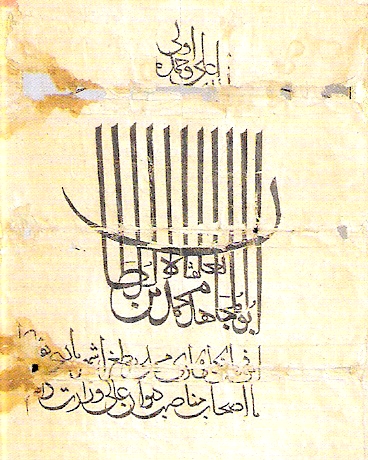Vincent Arthur Smith, The Oxford History of India: From the Earliest Times to the End of 1911 (Clarendon Press, 1920), 241-2. as quoted in Spencer, Robert (2018). The history of Jihad: From Muhammad to ISIS.
Muhammad ibn Tughlaq: Frasi in inglese
Lal, K. S. (1992). The legacy of Muslim rule in India. New Delhi: Aditya Prakashan. Chapter 5
Lal, K. S. (1990). Indian Muslims, who are they.
Ziyauddin Barani, quoted from Lal, K. S. (1999). Theory and practice of Muslim state in India. New Delhi: Aditya Prakashan. Chapter 5. Also quoted in Robert Spencer, The history of Jihad, 2018.
Ibn Battuta, 123. quoted from Lal, K. S. (1994). Muslim slave system in medieval India. New Delhi: Aditya Prakashan. Chapter 12
Lal, K. S. (1999). Theory and practice of Muslim state in India. New Delhi: Aditya Prakashan. Chapter 3
Tughlaq Kalina Bharata, Persian texts translated into Hindi by S.A.A. Rizvi, 2 Volumes, Aligarh, 1956-57. p. 327 ff. Vol I.
Masalik-ul-Absar, E and D, III, p. 580. Ibn Battuta, p. 63, Hindi version by S.A.A. Rizvi in Tughlaq Kalin Bharat, Part I, Aligarh, p. 189. quoted from Lal, K. S. (1992). The legacy of Muslim rule in India. New Delhi: Aditya Prakashan. Chapter 7
Ibn Battutah, trs. Mahdi Husain, p. 105-140. quoted from Lal, K. S. (1999). Theory and practice of Muslim state in India. New Delhi: Aditya Prakashan. Chapter 5
Tughlaq Kalina Bharata, Persian texts translated into Hindi by S.A.A. Rizvi, 2 Volumes, Aligarh, 1956-57. p. 325 ff. Vol I. (Shihabuddin Al Umari.) Also quoted (using a different translation) in Jain, Meenakshi (2011). The India they saw: Foreign accounts. 8th to 15th Centuries, p. 274.
Lal, K. S. (1994). Muslim slave system in medieval India. New Delhi: Aditya Prakashan. Chapter 5 (quoting Masalik-ul-Absar, E.D., III, 580., Battutah)
Battuta, Mahdi Husain, 235; Quaunah Turks, 155 n. ; Masalik-ul-Absar, E.D., III, 580-81. (Shihabuddin al-Umri, Masalik-ul-Absar fi Mumalik-ul-Amar) quoted from Lal, K. S. (1994). Muslim slave system in medieval India. New Delhi: Aditya Prakashan. Chapter 10
